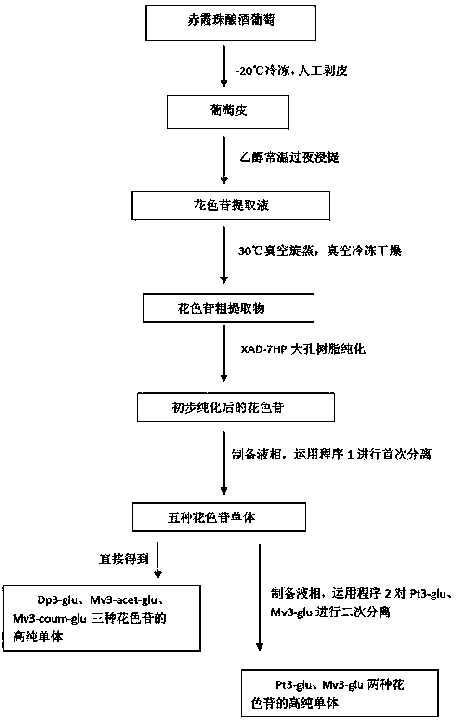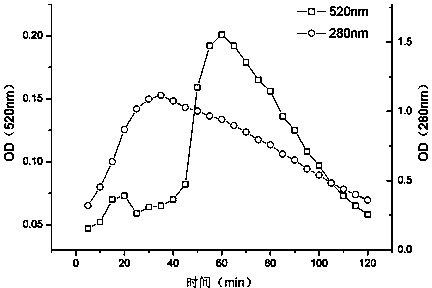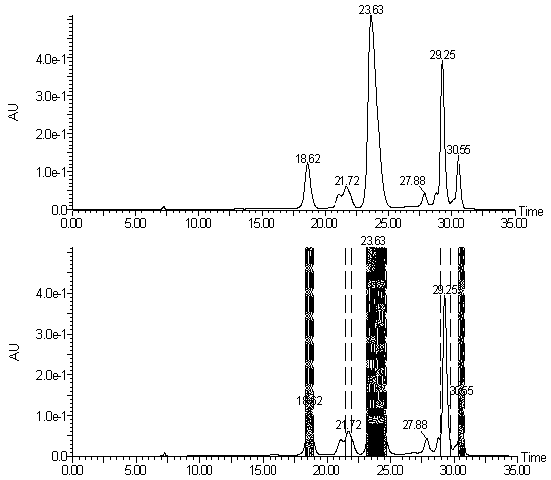Method for separating and preparing five high-purity anthocyanidin monomers from grape skins
An anthocyanin and grape skin technology, applied in the field of food safety and food analytical chemistry, can solve the problems of in-depth research limitations, less standard anthocyanin samples, lack of anthocyanin color, etc., and achieve the effect of environmental friendliness and easy separation and operation
- Summary
- Abstract
- Description
- Claims
- Application Information
AI Technical Summary
Problems solved by technology
Method used
Image
Examples
Embodiment 1
[0032] Example 1: Extraction of anthocyanins from grape skin
[0033] Frozen the harvested fresh and mature Cabernet Sauvignon wine grapes at -20°C. When the freezing is complete, take them out of the refrigerator and place them at room temperature to thaw the peels and peel them off (this method can be better for the peel and pulp Separation without sticking to the pulp). The extract is 95% ethanol (analytical pure) containing 1% hydrochloric acid (V / V), and is leached overnight at 30°C at a liquid-to-solid ratio of 1.5:1 by weight of extract: grape skin. The peel was filtered off and centrifuged at 6000 rpm for 10 min to remove the precipitate to obtain the extract.
Embodiment 2
[0034] Example 2: Processing of macroporous resin and preparation of sample loading
[0035] Soak the XAD-7HP macroporous resin with ethanol (analytical grade) first, and wash it every 12h until the eluate is colorless and transparent, and then wash it with deionized water until it is alcohol-free. Then it was soaked in 1mol / L NaOH for 12h, and then washed with deionized water to neutral pH. Change to 1mol / L HCl soaking for 12h, and finally wash with deionized water to neutral pH, and install the column for later use.
[0036] The extract obtained by the treatment in Example 1 was vacuum rotary evaporated at 30° C. to remove ethanol, and then freeze-dried in vacuum to obtain a crude anthocyanin extract. The crude extract was dissolved in 50% ethanol (analytical purity diluted to 50%, V / V) until the solution was saturated, centrifuged at 8000r for 6min, filtered with a 0.45μm organic microporous membrane, and prepared for injection.
Embodiment 3
[0037] Example 3: Purification of anthocyanins in grape skins by macroporous resin
[0038] Pack the processed XAD-7HP macroporous resin on a column, and equilibrate with a solution of 0.1% hydrochloric acid (V / V) in 50% ethanol (diluted to 50% for analytical pure ethanol, V / V) for 0.5h. Sample injection at a flow rate of 0.5BV / h, eluted with a solution of 0.1% hydrochloric acid (V / V) in 50% ethanol (diluted to 50%, V / V for analytical pure ethanol) at a flow rate of 1BV / h, and collect the eluent (red) .
[0039] The characteristic absorption peak of anthocyanin is around 520nm, so the 520nm spectral absorption signal is used to monitor the change of anthocyanin content in the eluent. Impurity substances with benzene ring have strong spectral absorption at 280nm, so 280nm is used to monitor the content of impurities in the effluent.
[0040] Since the anthocyanins flowed out, samples were taken every 5 minutes to determine their absorbance values at 520 nm and 280 nm. The collecti...
PUM
 Login to View More
Login to View More Abstract
Description
Claims
Application Information
 Login to View More
Login to View More - R&D
- Intellectual Property
- Life Sciences
- Materials
- Tech Scout
- Unparalleled Data Quality
- Higher Quality Content
- 60% Fewer Hallucinations
Browse by: Latest US Patents, China's latest patents, Technical Efficacy Thesaurus, Application Domain, Technology Topic, Popular Technical Reports.
© 2025 PatSnap. All rights reserved.Legal|Privacy policy|Modern Slavery Act Transparency Statement|Sitemap|About US| Contact US: help@patsnap.com



